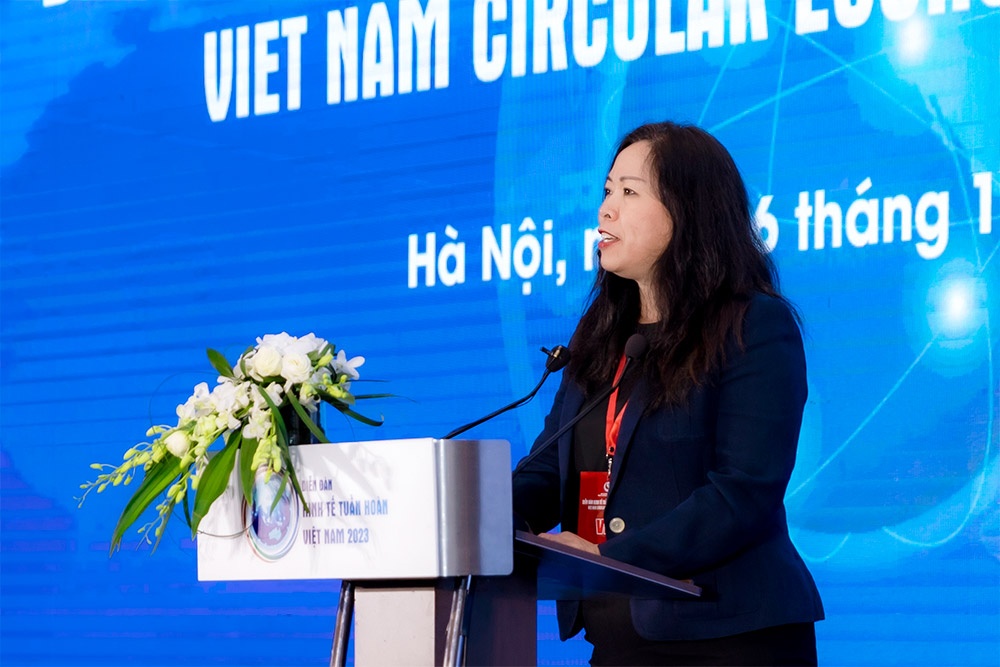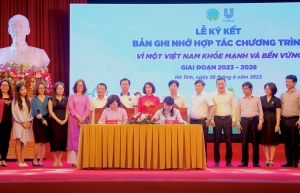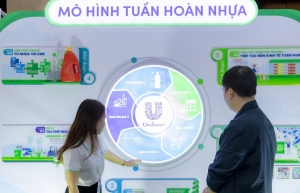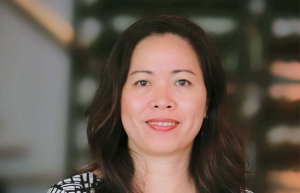Unilever consistent in sustainability in Vietnam
 |
| Unilever Vietnam chairwoman Nguyen Thi Bich Van spoke at the Vietnam Circular Economy Forum 2023 in Hanoi in November |
Unilever group’s path to sustainable development has been a fascinating long-term story inspired by Lever Brothers, a soap manufacturing and trading company in England in the 19th century, and is also an important piece that created the Unilever corporation.
Lever Brothers, under the direction of founder William Hesketh Lever, became a symbol of creativity and pioneering when introducing to the market a new soap brand called Sunlight Soap with innovations focusing on quality, advertised to protect women’s soft skin.
This was considered a very different business ideology at that time. It not only contributes to changing the perception of most consumers about personal hygiene but also breathes new life into the production and trading market of popular consumer goods. Businesses have since been caught up in a new competition based on product quality and sustainable values brought to the community.
After more than 100 years, Lever Brothers no longer exists, but its mission is still inherited and continued by its predecessor Unilever, the fifth-largest consumer goods company worldwide with net sales of about $62 billion in 2022. Unilever currently owns about 400 different brands with operations in more than 190 countries, including Vietnam.
Unilever’s sustainable development strategy focuses on 13 key goals to address issues consumers and stakeholders care deeply about, such as climate change, plastic pollution, and inequality to deliver growth that is consistent, competitive, profitable, and responsible.
On the official website, the business also states that it will take action to solve social and environmental problems facing the world, and at the same time wants to improve the lives of customers with their products.
“There wouldn’t be a sustainable Unilever without a sustainable planet,” said Alan Jope, former Unilever CEO. “We’ve got very hard evidence that brands that consumers see as having a positive impact on the society of the planet grow faster than the rest of the portfolio.”
Active expansion
In Vietnam, Unilever’s sustainable development strategy still adheres to the main goals set by the corporation but has flexible adjustments to suit the business environment. Programmes implemented by Unilever Vietnam focus on four pillars including climare action & nature, plastic circular economy, livelihood (empowering woman), and health and hygiene. The enterprise also actively expands strategic cooperation with government agencies, business partners and customers to achieve effective commitments on sustainable development.
“Doing business responsibly, benefiting people, and minimising impact on the environment has been the operating message of Unilever Vietnam for the past 28 years,” chairwoman Nguyen Thi Bich Van said. “Our ideal is to bring sustainable development to every family. Sustainable development does not only appear at Unilever, but only when a country and society develop can businesses develop,” she said.
Unilever’s persistent efforts in creating sustainable living for more than 100 years not only bring rich experience in sustainable development but also help businesses gain many advantages in the global green race towards the net-zero goal.
For 12 consecutive years, Unilever has been the only global corporation to continuously maintain the leading position in the list of sustainable businesses by GlobesScan and SustainAbility Leaders. On a global scale, the group also sets specific commitments to achieve the net-zero emissions target across the entire value chain by 2039.
In Vietnam, through initiatives to convert the use of clean energy, renewable energy, energy saving, recycling and reuse, and the plastic circular economy, Unilever achieved the net emissions target of zero in all internal operations in 2021, nine years ahead of the group’s global commitment.
This business also quickly added IREC renewable energy certificates to the power sources being used at all factories, offices, and distribution centres from 2016. All carbon emissions are through consumed electricity, thereby becoming carbon positive, contributing to Unilever’s goal of using 100 per cent renewable energy. Moreover, Unilever Vietnam also coordinates with the Ministry of Natural Resources and Environment (MoNRE) to green forests nationwide from 2021 with a commitment to plant one million trees in national parks and protective forests by 2025.
Bringing sustainable living
In the field of product packaging, Unilever recognises that turning plastic waste into a valuable resource is an important problem that needs to be solved and is trying to find ways to collect and process more plastic than the amount of packaging sold.
Unilever has implemented many initiatives in sustainable plastic waste management through the public-private partnership model with the MoNRE since 2020. After many efforts in cooperation with partners, Unilever has reached a milestone of reducing more than half of virgin plastic used in packaging, and almost two-thirds of packaging is recyclable. It collects and processes more than 20,000 tonnes of plastic waste, and supports livelihoods and improves welfare for more than 2,500 female workers in the informal waste collection workforce.
Many brands such as OMO, Comfort, Sunlight, and Cif under Unilever Vietnam have gradually switched to packaging made from recycled PCR plastic, which is environmentally friendly and better for consumers’ health. So far, 64 per cent of Unilever Vietnam’s packaging is recyclable, and 52 per cent of primary plastic is reduced by saving packaging or replacing with recycled plastic.
With the goal of bringing sustainable living to the masses to millions of Vietnamese, Unilever constantly strives to implement social commitments to help improve health and hygiene conditions for 25 million people through the implementation of more than 20 projects in collaboration with the Ministry of Health and related partners. Unilever Vietnam’s Personal Care business leads its peers while improving hygiene standards.
The “Green – Clean – Healthy Schools” programmes, implemented by Unilever Vietnam and the six brands of VIM, Lifebuoy, OMO, P/S, Knorr and Pureit and with strategic cooperation from the Ministry of Education and Training, have also been carried out to improve the sanitary environment for 330 schools. This has helped to build and maintain strong hygiene habits for nearly 231,000 students in more than 30 localities by the end of 2023. The programme is currently scheduled to last until 2025.
For an inclusive society, the company takes a pledge to support 10 million people to improve their health and wellbeing by 2030 and empower one million Vietnamese to achieve more in life with training and funding support by 2027. About 3.7 million women have participated in communication schemes on hygiene, nutrition, and health. While more than 45,000 women have been supported with training and empowered to confidently participate in the economy.
Unilever Vietnam confirms that improving health and improving the quality of life for more than 20 million Vietnamese citizens, halving the impact on the environment by 2030 will still be the four main pillars in the long-term sustainable development plan.
With efforts throughout, foreign-invested enterprises run and managed by Vietnamese people Unilever have achieved proud achievements when production and business activities have switched to using 100 per cent renewable energy. The entire Unilever factory system in Vietnam has no toxic waste to landfill and is carbon neutral.
The green transformation journey at Unilever has achieved the dual goals of economic growth, contributing to environmental protection, creating positive social values, and contributing to the realisation of the group’s sustainable development strategy. Le Thi Hong Nhi, director of Communications and External Affairs at Unilever Vietnam shared, “We believe that a zero-emissions world - where nature is revived - is something we can realise together. Unilever Vietnam is committed to continuing to spread the green transition and sustainable business to hundreds of partners throughout the value chain, becoming a driving force for systemic transformation of the economy.”
 | Unilever Vietnam and Ministry of Health strengthen partnership Continuing the success of the cooperation over the past 15 years to improve health and hygiene conditions for Vietnamese people, Unilever Vietnam and the Ministry of Health (MoH) have just signed a strategic cooperation programme titled For a Healthy and Sustainable Vietnam until 2028. |
 | Unilever Vietnam brings circular economy for plastics to life Unilever Vietnam has continuously implemented a series of programmes to promote green and sustainable development, covering everything from the environment to people and highlighting the need for social responsibility. |
 | Unilever Vietnam embracing circular economic benefits With only one-third of plastic waste being recycled, Vietnam is losing nearly 70 per cent of the value of plastic materials, equivalent to nearly $2.2-2.9 billion a year, because of disposal into the environment. |
What the stars mean:
★ Poor ★ ★ Promising ★★★ Good ★★★★ Very good ★★★★★ Exceptional
Related Contents
Latest News
More News
- A golden time to shine within ASEAN (February 19, 2026 | 20:22)
- Vietnam’s pivotal year for advancing sustainability (February 19, 2026 | 08:44)
- Strengthening the core role of industry and trade (February 19, 2026 | 08:35)
- Future orientations for healthcare improvements (February 19, 2026 | 08:29)
- Infrastructure orientations suitable for a new chapter (February 19, 2026 | 08:15)
- Innovation breakthroughs that can elevate the nation (February 19, 2026 | 08:08)
- ABB Robotics hosts SOMA Value Provider Conference in Vietnam (February 19, 2026 | 08:00)
- Entire financial sector steps firmly into a new spring (February 17, 2026 | 13:40)
- Digital security fundamental for better and faster decision-making (February 13, 2026 | 10:50)
- Aircraft makers urge out-the-box thinking (February 13, 2026 | 10:39)

 Tag:
Tag:















 Mobile Version
Mobile Version